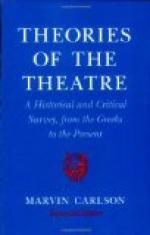A great many of our contemporary playwrights travel like Cook’s tourists through the traditional subject-matter of the theatre. They stop off here and there, at this or that eternal situation; but they do not, by imagination, make it real. Thereby they miss the proper function of the dramatist, which is to imagine some aspect of the perennial struggle between human wills so forcibly as to make us realise it, in the full sense of the word,—realise it as we daily fail to realise the countless struggles we ourselves engage in. The theatre, rightly considered, is not a place in which to escape from the realities of life, but a place in which to seek refuge from the unrealities of actual living in the contemplation of life realised,—life made real by imagination.
The trouble with most ineffective plays is that the fabricated life they set before us is less real than such similar phases of actual life as we have previously realised for ourselves. We are wearied because we have already unconsciously imagined more than the playwright professionally imagines for us. With a great play our experience is the reverse of this. Incidents, characters, motives which we ourselves have never made completely real by imagination are realised for us by the dramatist. Intimations of humanity which in our own minds have lain jumbled fragmentary, like the multitudinous pieces of a shuffled picture-puzzle, are there set orderly before us, so that we see at last the perfect picture. We escape out of chaos into life.




